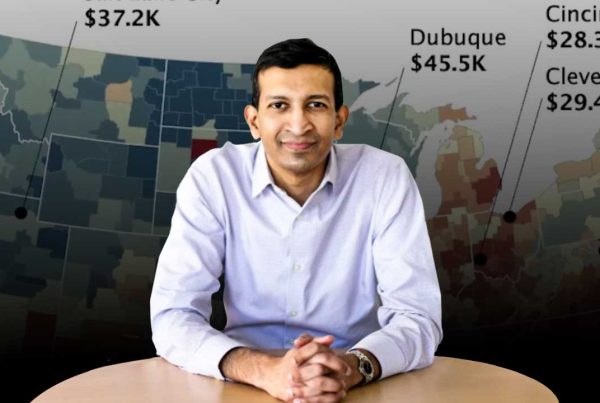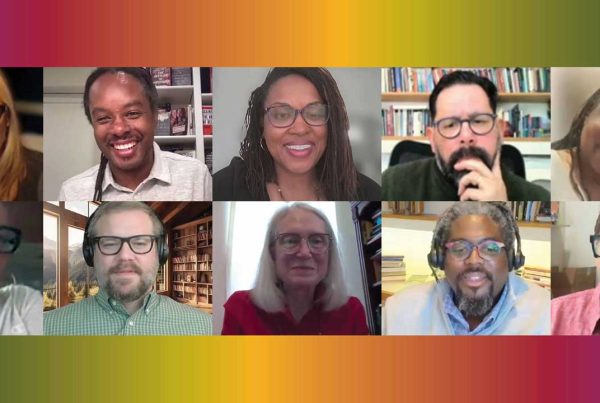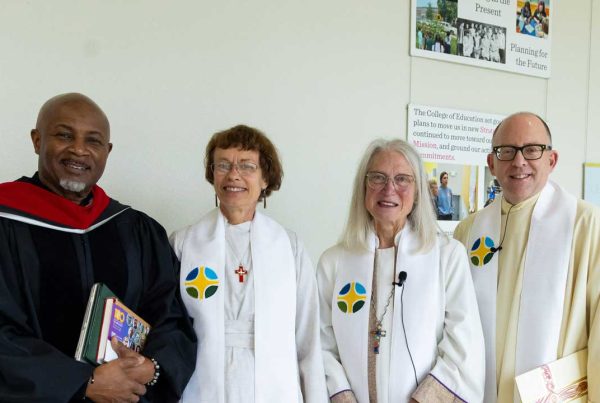Faith & the Mental Health Crisis: A Call to Action
CTS Talks Kicks Off 2024-2025 Series with Hannah L. Maxey, PhD
CTS Talks return for the 2024-2025 academic year, an initiative inspired by the renowned “TED Talk” format and designed to foster engaging discussions and deepen understanding on critical issues. This year, the series begins with a compelling presentation by Hannah L. Maxey, PhD, a nationally recognized expert in health workforce policy and Director of the Bowen Center for Health Workforce Research and Policy at the Indiana University School of Medicine. Her talk, titled “Mental Health: The Crisis and a Call to Action for People of Faith,” will set the stage for a series of thought-provoking discussions at the intersection of faith, health, and society.
Dr. Maxey’s journey from a dental hygienist in public health clinics to a leader in health workforce research is nothing short of inspiring. She began her career in 2000, working in low-income health center clinics, where she developed a deep interest in health disparities, health equity, and access to care. This passion led her to pursue a master’s degree and PhD in Health Policy and Management. Her extensive research into health workforce policies and their impact on healthcare access and disparities led to her recruitment by Indiana University, where she re-established the Bowen Center for Health Workforce Research and Policy in 2014.
The Bowen Center, under Dr. Maxey’s leadership, focuses on informing health workforce policy to advance health equity through translational research, committed service, and collaborative leadership. Dr. Maxey mentors public health students, medical residents, and dental students, providing expert and technical assistance for health policy research related to the workforce. Her work involves close collaboration with state government, data stewardship, and addressing critical workforce needs in mental and behavioral health.
One of Dr. Maxey’s significant projects is the Mental Health Playbook, developed in partnership with the Lilly Endowment. This initiative aims to address the longstanding shortages of mental and behavioral health clinicians in Indiana, a problem exacerbated by the COVID-19 pandemic. The Playbook focuses on understanding the postsecondary pipeline to independent practice for licensed behavioral and mental health professionals in the state. It examines each step of the process—from education to clinical supervision—and identifies trends, barriers, and opportunities to strengthen programs and the workforce.
Dr. Maxey explained the significance of the Mental Health Playbook during our interview. “The Playbook addresses the critical shortage of mental health professionals, which impacts everyone, especially in the post-pandemic era,” she said. “It aims to understand why, despite having many academic institutions producing graduates, we are not seeing a reduction in workforce shortages.”
The Playbook involved extensive research and engagement with various stakeholders, including educational institutions, employers, state agencies, and public policy experts. It culminated in a set of recommendations under four main headers: addressing training deserts, strengthening clinical training partnerships, school-based health services, and ongoing strategic recommendations.
CTS was highlighted as an institutional best practice within the Playbook, recognized for its unique model of providing education, clinical experience, and community outreach. “CTS is a one-stop shop,” Dr. Maxey noted. “You train, you provide education, and you provide the clinical experience that is an outreach in our community. This is unique and exemplifies a faith-based institution’s commitment to both their students and their community.”
Dr. Maxey’s talk, “Mental Health: The Crisis and a Call to Action for People of Faith,” emphasizes the vital role faith communities can play in addressing the mental health crisis. “The crisis of mental health in America should be seen as a call to action for people of faith,” she said. “Communities of faith and their leaders are strategically positioned to equip themselves and extend mental health care and support for their congregations and communities. This crisis is an opportunity for religious leaders to be ambassadors of love and hope.”
She underscored the importance of reducing the stigma associated with mental illness and creating supportive environments within faith communities. “Training clinical therapists is only part of the puzzle,” Dr. Maxey emphasized. “We need other innovations and developments for faith-based leaders and communities to extend mental health support. Pastors, graduates, everyday citizens, mental health practitioners—we can all support the mental health well-being of our communities.”
Dr. Maxey’s commitment to reducing health disparities and improving healthcare access is deeply rooted in her ethical values and faith tradition. Growing up in a family with a strong faith background—her father is a retired pastor—instilled in her a sense of responsibility to serve others. “We are all the least of these, and we should be doing the best we can for all our neighbors,” she shared. “Mental health is one of those crises communities are facing now. It’s an honor to partner with CTS, and I believe in the work you are doing.”
Dr. Hannah L. Maxey’s presentation on September 12, 2024, promises to be a powerful and inspiring start to the 2024-2025 CTS Talks series. Her insights into the mental health crisis and the crucial role faith communities can play in addressing it will undoubtedly resonate with attendees and encourage action. As CTS continues to advance its mission of scholarship and formation, this year’s CTS Talks series stands as a testament to the seminary’s dedication to fostering intellectual curiosity and addressing critical societal issues.






